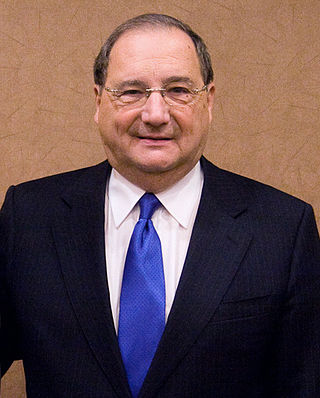
Abraham Henry Foxman is an American lawyer and activist. He served as the national director of the Anti-Defamation League (ADL) from 1987 to 2015, and is currently the League's national director emeritus. From 2016 to 2021 he served as vice chair of the board of trustees at the Museum of Jewish Heritage in New York City in order to lead its efforts on antisemitism.

Stephen Donald Black is an American white supremacist. He is the founder and webmaster of the neo-Nazi, Holocaust denial, and homophobic website Stormfront. He was a Grand Wizard in the Ku Klux Klan and a member of the American Nazi Party in the 1970s, though at the time he was a member it was known as the "National Socialist White Peoples' Party". He was convicted in 1981 of attempting an armed overthrow of the government in the island of Dominica in violation of the U.S. Neutrality Act.

Michael Allen Geist is a Canadian academic, and the Canada Research Chair in Internet and E-Commerce Law at the University of Ottawa. He is the editor of four books on copyright law and privacy law, and he edits two newsletters on Canadian information technology and privacy law.

Internet governance consists of a system of laws, rules, policies and practices that dictate how its board members manage and oversee the affairs of any internet related-regulatory body. This article describes how the Internet was and is currently governed, some inherent controversies, and ongoing debates regarding how and why the Internet should or should not be governed in the future.
Electronic Frontiers Georgia (EFGA) is a non-profit organization in the US state of Georgia focusing on issues related to cyber law and free speech. It was founded in 1995 by Tom Cross, Robert Costner, Chris Farris, and Robbie Honerkamp, primarily in response to the Communications Decency Act.
An anonymous post, is an entry on a textboard, anonymous bulletin board system, or other discussion forums like Internet forum, without a screen name or more commonly by using a non-identifiable pseudonym. Some online forums such as Slashdot do not allow such posts, requiring users to be registered either under their real name or utilizing a pseudonym. Others like JuicyCampus, AutoAdmit, 2channel, and other Futaba-based imageboards thrive on anonymity. Users of 4chan, in particular, interact in an anonymous and ephemeral environment that facilitates rapid generation of new trends.
K. A. (Kim) Taipale is a Finnish-American investor and legal scholar specializing in information, technology, and national security policy. He is a partner in Stilwell Holding, a private investment firm, a director of the Stilwell Charitable Fund, and the former chairman of the executive committee of Kobra International Ltd.
Internet safety, also known as online safety, cyber safety and electronic safety (e-safety), refers to the policies, practices and processes that reduce the harms to people that are enabled by the (mis)use of information technology.
Information technology law, also known as information, communication and technology law or cyberlaw, concerns the juridical regulation of information technology, its possibilities and the consequences of its use, including computing, software coding, artificial intelligence, the internet and virtual worlds. The ICT field of law comprises elements of various branches of law, originating under various acts or statutes of parliaments, the common and continental law and international law. Some important areas it covers are information and data, communication, and information technology, both software and hardware and technical communications technology, including coding and protocols.
The Electronic Frontier Foundation (EFF) is an international non-profit digital rights group based in San Francisco, California. It was founded in 1990 to promote Internet civil liberties.
Stormfront is a neo-Nazi Internet forum, and the Web's first major racial hate site. The site is focused on propagating white nationalism, Nazism, antisemitism and Islamophobia, as well as antifeminism, homophobia, transphobia, Holocaust denial, and white supremacy.
Cyberstalking is the use of the Internet or other electronic means to stalk or harass an individual, group, or organization. It may include false accusations, defamation, slander and libel. It may also include monitoring, identity theft, threats, vandalism, solicitation for sex, doxing, or blackmail. These unwanted behaviors are perpetrated online and cause intrusion into an individual's digital life as well as negatively impact a victim's mental and emotional well-being, as well as their sense of safety and security online.
The Future of Privacy Forum is a Washington DC–based think tank and advocacy group focused on issues of data privacy. It is jointly supported by corporate sponsors and foundations.

The Anti-Defamation League (ADL), formerly known as the Anti-Defamation League of B'nai B'rith, is a New York-based international non-governmental organization that was founded to combat antisemitism, as well as other forms of bigotry and discrimination. ADL is also known for its pro-Israel advocacy. Its current CEO is Jonathan Greenblatt. ADL headquarters are located in Murray Hill, in the New York City borough of Manhattan. The ADL has 25 regional offices in the United States including a Government Relations Office in Washington, D.C., as well as an office in Israel and staff in Europe. In its 2019 annual information Form 990, ADL reported total revenues of $92 million, the vast majority from contributions and grants. Its total operating revenue is reported at $80.9 million.
David R. Johnson is an American lawyer specializing in computer communications. He is a senior fellow at Center for Democracy and Technology, and a former chairman of the Electronic Frontier Foundation.
There is no commonly agreed single definition of “cybercrime”. It refers to illegal internet-mediated activities that often take place in global electronic networks. Cybercrime is "international" or "transnational" – there are ‘no cyber-borders between countries'. International cybercrimes often challenge the effectiveness of domestic and international law, and law enforcement. Because existing laws in many countries are not tailored to deal with cybercrime, criminals increasingly conduct crimes on the Internet in order to take advantages of the less severe punishments or difficulties of being traced.
Fred Harrison Cate is a distinguished professor and the C. Ben Dutton Professor of Law at Indiana University Maurer School of Law. From 2015 to 2023, he served as Indiana University's Vice President for Research. He served as founding director and is now a senior fellow of the Center for Applied Cybersecurity Research. Cate specializes in information privacy and security law issues. He has testified before numerous congressional committees and speaks frequently before professional, industry, and government groups.

Danielle Keats Citron is a Jefferson Scholars Foundation Schenck Distinguished Professor in Law at the University of Virginia School of Law, where she teaches information privacy, free expression, and civil rights law. Citron is the author of "The Fight for Privacy: Protecting Dignity, Identity, and Love in the Digital Age" and "Hate Crimes in Cyberspace" (2014). She also serves as Vice President and Secretary of the Cyber Civil Rights Initiative, an organization that provides assistance and legislative support to victims of image-based sexual abuse and other forms of online abuse. Prior to joining UVA Law, Citron was an Austin B. Fletcher Distinguished Professor of Law at Boston University Law School, and was also the Morton & Sophia Macht Professor of Law at the University of Maryland School of Law.

Israeli Students combating antisemitism (ISCA) online has been founded in 2011 and operates with the purpose of fighting the growing antisemitism, xenophobia and Holocaust denial on the internet.

Evan R. Bernstein is an American public figure and community leader, known for his work with Jewish NGOs. He worked for the Anti-Defamation League (ADL) from 2013 and became the inaugural CEO and National Director of Community Security Service (CSS) in May 2020. Since November 2023, Bernstein has been the vice president of community relations at the Jewish Federations of North America (JFNA).







